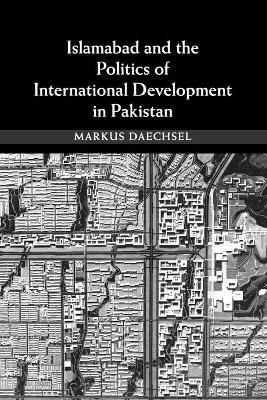
Islamabad and the Politics of International Development in Pakistan
Seiten
2017
Cambridge University Press (Verlag)
978-1-107-67999-3 (ISBN)
Cambridge University Press (Verlag)
978-1-107-67999-3 (ISBN)
A highly original history of the design and development of Pakistan's capital city; one of the most iconic and ambitious urban reconstruction projects of the 1950s and 1960s. Balancing archival research with fresh theoretical insights, Markus Daechsel surveys the project's successes and failures, evaluating Islamabad's place in post-war international development.
This is a highly original account of the design and development of Pakistan's capital city; one of the most iconic and ambitious urban reconstruction projects of the twentieth century. Balancing archival research with fresh, theoretical insights, Markus Daechsel surveys the successes and failures of Greek urbanist Constantinos A. Doxiadis's most ambitious endeavour, Islamabad, analysing how the project not only changed the international order, but the way in which the Pakistani state operated in the 1950s and 1960s. In dissecting Doxiadis's fraught encounter with Pakistani policy makers, bureaucrats and ordinary citizens, the book offers an unprecedented account of Islamabad's place in post-war international development. Daechsel provides new insights into this period and explores the history of development as a charged, transnational venture between foreign consultants and donors on the one side and the postcolonial nation state on the other.
This is a highly original account of the design and development of Pakistan's capital city; one of the most iconic and ambitious urban reconstruction projects of the twentieth century. Balancing archival research with fresh, theoretical insights, Markus Daechsel surveys the successes and failures of Greek urbanist Constantinos A. Doxiadis's most ambitious endeavour, Islamabad, analysing how the project not only changed the international order, but the way in which the Pakistani state operated in the 1950s and 1960s. In dissecting Doxiadis's fraught encounter with Pakistani policy makers, bureaucrats and ordinary citizens, the book offers an unprecedented account of Islamabad's place in post-war international development. Daechsel provides new insights into this period and explores the history of development as a charged, transnational venture between foreign consultants and donors on the one side and the postcolonial nation state on the other.
Markus Daechsel is Senior Lecturer in Modern Islamic History at Royal Holloway University of London.
Introduction; 1. Architect of development; 2. The consultant's gaze; 3. From great plan to great project; 4. On the road to Islamabad; 5. Planning the Muslim city of the future; 6. The consultant under attack; Conclusion; Bibliography.
| Erscheinungsdatum | 07.06.2017 |
|---|---|
| Zusatzinfo | 26 Halftones, unspecified; 26 Halftones, black and white |
| Verlagsort | Cambridge |
| Sprache | englisch |
| Maße | 153 x 230 mm |
| Gewicht | 500 g |
| Themenwelt | Geisteswissenschaften ► Geschichte ► Regional- / Ländergeschichte |
| Geisteswissenschaften ► Geschichte ► Teilgebiete der Geschichte | |
| Naturwissenschaften ► Geowissenschaften ► Geografie / Kartografie | |
| Sozialwissenschaften ► Politik / Verwaltung | |
| ISBN-10 | 1-107-67999-0 / 1107679990 |
| ISBN-13 | 978-1-107-67999-3 / 9781107679993 |
| Zustand | Neuware |
| Haben Sie eine Frage zum Produkt? |
Mehr entdecken
aus dem Bereich
aus dem Bereich
Erinnerungen
Buch | Softcover (2024)
Pantheon (Verlag)
16,00 €
Universalgelehrter, Polarreisender, Entdecker
Buch | Hardcover (2024)
mareverlag
28,00 €


